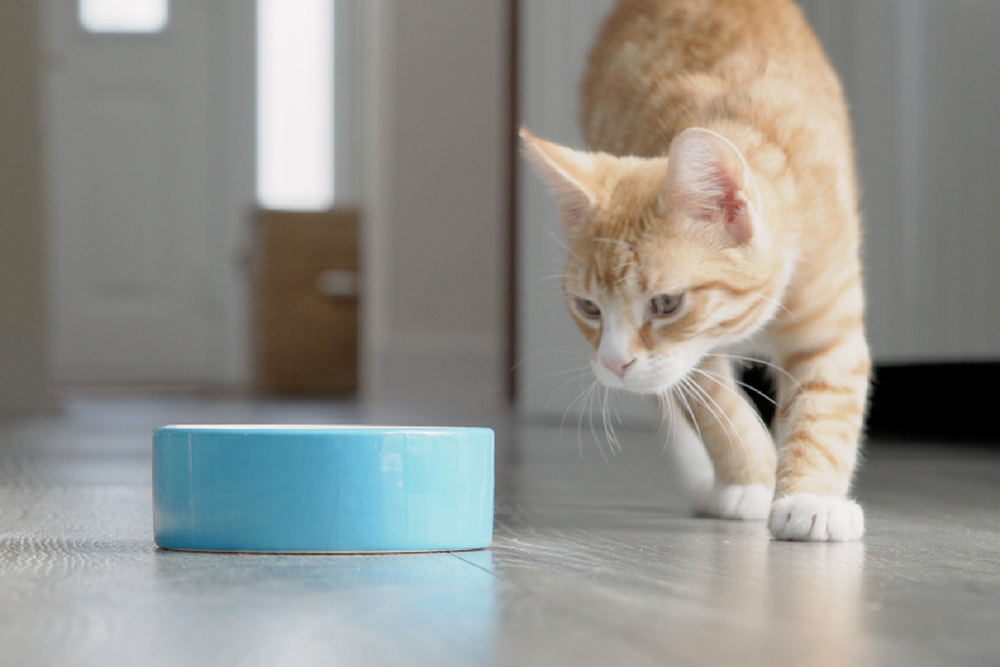Lick 'n' Lap™
Snack
Chicken Flavor & Salmon Flavor
Available in Single or Multipack


Our cats are designed to hunt their food. Their wild ancestors earned their meals by stalking, chasing and pouncing on their prey, and they needed a lean, power-packed diet to do so. Even though they're thoroughly domesticated these days, our little hunters require the same nutrients their ancestors enjoyed when they were roaming the desert, and they can rapidly gain weight if they eat the wrong stuff.
With experts warning of a feline obesity epidemic, it's more important than ever that we give our cats the nutrition they need. Soin this piece, we're going to offer a series of healthy cat food choices and tell you how to ensure a fine blend of foodstuffs for your furry friend.

Your cat is an obligate carnivore, which basically means they depend on meat for survival: they cannot obtain all the nutrients they need from plants. The meat should contain a high amount of protein with smaller amounts of fats and carbohydrates: the core nutrients that cats would get from eating birds and rodents in the wild. All three of these nutrients provide energy, and they offer lots of other benefits too.
As well as being your cat's primary energy source, protein aids the development of their organs and tissues. It fuels their nervous and immune systems and sustains their skin, fur, nails, tendons and cartilage. In addition, it provides amino acids such as taurine, which support their reproductive and heart-muscle functions. With all these benefits, protein should be the core component of all feline diets.
Fats, meanwhile, help transport nutrients around the cat's cells, maintain body temperature, aid the development of essential hormones like testosterone and reduce the risk of infection. Furthermore, fatty acids like Omega-3 and Omega-6 are essential for normal growth: sha even shown that these acids can help reduce the risk of cancer and heart problems.
Carbohydrates are not strictly essential, but they provide an alternative source of fuel. This in turn makes the use of protein more efficient with carbs providing a secondary energy source, the protein can be saved for essential bodily tasks.
In addition to these three basic elements, a quality cat food diet should also contain the following:

All healthy cat food options should include the basic balance outlined above: high quantities of protein with smaller amounts of carbs and fat. The minerals, acids and vitamins should also be clearly marked when you read the label.
There are loads of good sources of protein for your cat, including beef, chicken, lamb and fish - basically all your cat's favorite things! The protein should constitute at least 30% of the food's overall content, although many cat food products will include more than this.
If you're looking for good sources of fat, it's worth focusing on fish products like tuna, mackerel and sardines (all three of these options are great for omega-3). And carbohydrates can be found in grains, oats and barley, amongst others.

This is a question asked by pet parents everywhere, and there are pros and cons to each. Dry food is often better for your cat's teeth, but wet food often contains more protein and, because it contains water, is better for hydration (if you're providing a lot of dry food, make sure you give kitty plenty of water to wash it down).
The good news is that both wet and dry options can be healthy for your cat and provide a good natural balance. Cat food brands do vary significantly in quality, however, so it's important to choose the right one.
The healthiest wet cat food will include meats such as chicken and turkey, and you can also look for natural ingredients like fruits, oats and vegetables. As we've already established, the food should contain a large amount of protein, with a moderate amount of fat anda small dose of carbs.
The same basic rules apply to dry cat food products like kibble. When you look at the list of ingredients, a healthy dry product will show meat or fish right at the top, and ideally the food will be free of chemical preservatives and added sugars. If the food also includes probiotics and prebiotics, all the better: this will help support digestive health.

Some experts argue that organic cat food is healthier for your cat. They suggest that the food contains more genuine meat (rather than by-products) and the lack of chemicals makes the meal easy to digest. However there is still no conclusive evidence to prove that organic cat food is healthier than non- organic.
Of course, organic food is healthier for the planet as a whole, so we'd certainly encourage you to go down this route.

Ok, now we've done all the sciency stuff, time for something a bit more fun: a list of healthy cat food options that you can easily make yourself!
Here are three DIY treat ideas which taste great and can have amazing health benefits for your cat.
If you want a pre-made suggestion to get you started, try our Meaty Morsels Chicken with Salmon recipe. It includes Omega 3 fatty acids and supports the development of a healthy skin and coat. Check it out here.
1. https://todaysveterinarypractice.com/the- obesity-epidemic-in-our-patients/
2. https://www.britannica.com/science/ obligate-carnivore
3. https://www.ncbi.nlm.nih.gov/pmc/ articles/PMC5753635/
4. https://www.petmd.com/cat/nutrition/ cat-nutrition-what-makes-nutritional-cat- food
5. https://link.springer.com/chapter/ 10.1007/978-1-4899-0405-8_11
6. https://www.nasc.cc/pet-university/ taurine-deficiency-cats/
7. https://www.petmd.com/cat/centers/ nutrition/slideshows/why-cat-food-fat-is- good#slide-1
8. https://www.petmd.com/cat/centers/ nutrition/slideshows/why-cat-food-fat-is- good#slide-4
9. https://www.re archgate.net/publication/ 272784328_The_role_of_dietary_omega- 3_and_omega-6_essential_fatty_acids_in _the_nutrition_of_dogs_and_cats_A_rev iew
10. https://www.petcurean.com/blog/do- cats-need-carbohydrates/
11. https://www.nasc.cc/pet-university/ vitamin-deficiency-cats #:-:text=Vitamin%20A%20is%20an%20ess ential, vitamin%20A%20for%20proper%20f unction.
12. https://www.petmd.com/cat/nutrition/ cat-nutrition-what-makes-nutritional-cat- food
13. https://www.nap.edu/resource/10668/ cat_nutrition_final.pdf
14. https://www.petmd.com/cat/nutrition/ do-cats-need-high-protein-cat- food#:-:text=from%20plant%20sources.-, A nimal%20Protein,meals%20or%20meat%2 Oby%2Dproducts.
15. https://www.petmd.com/cat/nutrition/ do-cats-need-high-protein-cat- food#:-:text=Some%20feline%20diets%20a re%2030, mass%20than%20high%2Dquality %20protein.
16. https://petkeen.com/do-cats-need-fat- in-their-diet/
17. https://www.petcurean.com/blog/do- cats-need-carbohydrates/
18. https://www.expertreviews.co.uk/pets/ 1413281/best-dry-wet-cat-food
19. https://www.nbcnews.com/shopping/ pets/best-cat-food-n1235804
20. https://todaysveterinarynurse.com/ articles/prebiotics-and-probiotics-for-dogs- and-cats/
21. https://www.hepper.com/homemade- cat-food/
22. https://supakit.co/blogs/news/ homemade-tuna-cat-treats-your-cat-will- go-crazy-for
23. https://joythebaker.com/2015/02/ homemade-salmon-oat-cat-treats/

Squeeze this creamy, low-calorie treat right from the tube onto your cat’s tongue and watch your cat lick 'n' lap it all up!

Cats love the size, texture and high meat content of these soft and tasty, double-meaty treats!

High meat content (>70%), small batch production and premium ingredients combine to make these truly irresistible.

Tender chicken fillet pieces in a thick and creamy stew! Great for older cats!